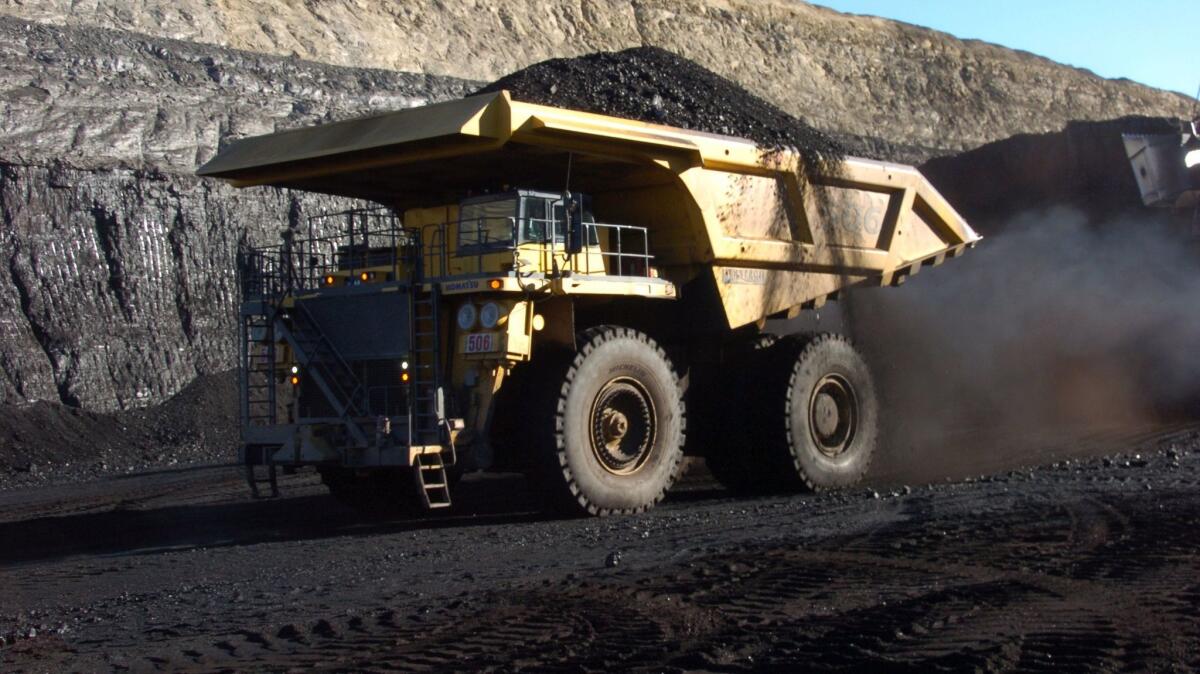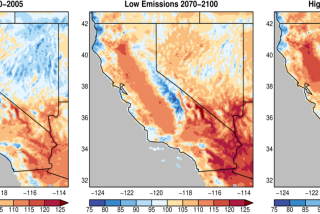Coal states sue California cities and Washington state to force ports to ship exports

Buffeted by falling domestic demand, Americaâs ailing coal industry set its sights a decade ago on the promise of reaching Asian markets. But that meant shipping from West Coast ports, and politicians there had other ideas.
Some coastal communities, taking a stand against coal to fight climate change and protect public health, acted to block the exports. And now coal states are fighting back in the courts â all the way to the Supreme Court â and using taxpayer funds to boost a fading industry.
âWe believe that these coastal states are using their local authorities for land-use planning to essentially block interstate commerce,â said Utah Mining Assn. President Brian Somers. âIf California produce or other commodities come through on a train, we donât have the authority to stop them at the border. Thatâs whatâs happening to our coal.â
If all had gone according to the coal industryâs plan, as many as seven ports in California, Oregon and Washington might have become gateways to energy-hungry Japan, China and India â and a lifeline for coal producers in landlocked Western states.
Instead, the industry has endured one setback after another.
Demand in Asia proved more volatile than expected. The home market worsened because of competition from cheap gas and renewable energy, and coal-fired power plants continued to close. President Trumpâs regulatory rollbacks didnât provide the industry renaissance he claims. On top of all that, the West Coast states and cities rebelled.
Lawmakers in Oakland and Washington state blocked plans for coal-export terminals, citing health concerns and pollution risks. Just last month the Richmond City Council gave the California cityâs port three years to phase out coal exports. Nearly all coal mined in Utah is exported to Japan through Richmond, an arrangement that would end under the new ordinance.
Coal companies and coal-state lawmakers quickly condemned the decisions as ideologically motivated and discriminatory, and acted.
Utah lawmakers, who previously agreed to spend $53 million to guarantee coal exports out of Oakland, are now weighing whether to set aside $500,000 to sue Richmond over its ban on coal handling and storage.
Montana and Wyoming have asked the U.S. Supreme Court to overturn Washingtonâs decision to deny a water-quality permit to Millennium Bulk Terminals, which effectively blocked one potential route for coal to reach overseas markets.
The two mining states depend on taxes from coal production to fund state services and public schools. In Utah, the coal industry is a smaller contributor to the stateâs revenues and employment, but it has an outsized influence in rural communities; while it employs only about 2,700 miners, the jobs are some of the highest-paying in the state.
Should the states lose their lawsuits, it could embolden left-leaning coastal states to use permitting decisions and zoning laws to fight global warming by preventing the export of fossil fuels. Alternatively, if the coal states win, they and other energy-producing states could try to force the West Coast to accept not only coal but also liquefied natural gas.
Economists who follow the coal industry say the Western statesâ lawsuits â and threats of future legal action â seem like acts of desperation and make little financial sense.
Tom Sanzillo, finance director at the Institute for Energy Economics and Financial Analysis, a Cleveland-based think tank, said that American coal is too expensive to compete in Asia with shipments coming out of Australia and Indonesia. Sending coal from the Powder River Basin of Montana and Wyoming to the West Coast and then across the Pacific Ocean is costly and leaves U.S. producers with scarcely any profit, he said.
Even coal giants like Peabody Energy, which bet heavily on the international market, have been unable to compete and are saddled with debt from trying. The company filed for bankruptcy protection in 2016.
Lawsuits to overturn the coal bans are little more than a âplay for time,â Sanzillo said, by states that rely on the industry for high-paying jobs and tax revenue.
âTheyâre kind of being unrealistic,â he added. âYou canât make a market with a lawsuit. Thereâs no market.â
Contrary to Trumpâs boasts of reviving the industry, American coal production fell to a 20-year low in 2019 and is expected to continue to decrease this year thanks to cheaper natural gas, wind and solar energy. Exports, the industryâs best hope, fell last year after two years of growth.
Clark Williams-Derry, another analyst at the think tank IEEFA, said that if Montana, Wyoming and Utah succeed in forcing the West Coast to open coal terminals, they might score political points, but they wonât be doing the industry any favors. The new ports could lock producers into long-term contracts that arenât profitable, forcing them to continue shipping their product overseas at a loss.
âThe bottom line is that these projects ... just donât pencil out,â Williams-Derry said.
Coal-state lawmakers donât it see that way.
Montana and Wyoming, in their Supreme Court petition, described the Asian market as âbooming.â If there were only more coal-export terminals on the West Coast, they say, American producers could compete.
âMany of the activists criticizing Montana and Wyomingâs lawsuit are either ignorant or disingenuous. There is unquestionable overseas demand for our coal and that demand continues to grow,â said Montana Chief Deputy Atty. Gen. Jon Bennion, who leads the team working on the lawsuit. âThe only impediment we face is Washington stateâs discriminatory and unconstitutional denial of permitting for an export terminal.â
A spokesman for the Montana attorney generalâs office said the states are sharing the legal costs, but declined to disclose how much has been spent on private attorneys.
Even as they battle West Coast opposition, coal producers could shift their focus to Mexico and Canada. Utah is exploring the possibility of shipping its coal through Baja Californiaâs Port of Ensenada, despite economistsâ doubts that the route would be profitable.
âI donât think weâll run into political hurdles there like we have in California and Western states,â said Somers, the Utah Mining Assn.âs president.
Not everyone in the mining states is behind the counteroffensive.
Joan Kresich, an environmental activist in Livingston, Mont., where coal trains pass regularly, sees the stateâs lawsuit on behalf of the coal industry as self-defeating: The state is using public money to revive an industry thatâs losing its market share, even as public services are being cut.
âIf coal can compete, then coal can compete. And if it canât compete, it needs to die away,â Kresich said. âBut the idea of trying to bully another community into accepting it â I think people all across the spectrum will not like that.â
Times staff writer Richard Read in Seattle contributed to this report.







